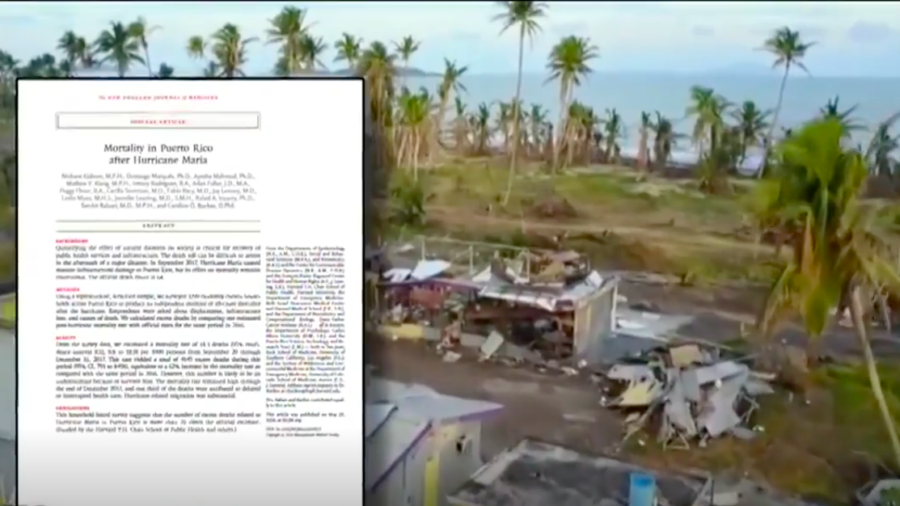![]()
![]()
Harvard University’s latest study published on May 29 in the New England Journal of Medicine (NEJM) estimated that the death toll from Hurricane Maria sits at 4,645—more than 70 times the current official death count of 64.
About one in 10 of the estimated deaths were directly caused by the hurricane, while about one-third of the deaths were attributed to delayed or interrupted healthcare, according to people who were surveyed in the NEJM study.
Hurricane Maria struck Puerto Rico on Sept. 20, 2017, and in the aftermath, many local residents were stranded without electricity and were unable to access health care.
The primary cause of high mortality rates in the months post-hurricane was due to interruption to medical care, the study authors concluded.
“Growing numbers of persons have chronic diseases and use sophisticated pharmaceutical and mechanical support that is dependent on electricity,” the authors wrote, adding that it is important to have contingency plans in place during and after such disasters to ensure the survival of people with chronic conditions.
Researchers say that obtaining accurate estimates of the deaths, injuries, and displacements following a disaster such as Hurricane Maria is “critical” to respond to the disaster and make preparations to respond to future such disasters.
In Puerto Rico, residents are now preparing for the 2018 hurricane season.
Official Death Toll vs. Estimate
To conduct the study, researchers surveyed 3,299 randomly chosen households across Puerto Rico. They found in total 38 people who died between Sept. 20 and the last day of 2017. They compared the results with statistics from 2016 in the same time period, and found a 62 percent increase in mortality rate in 2017—that is, 14.3 deaths per 1,000 people in that time, which corresponds to about 4,645 deaths.
This estimate is conservative, the researchers say, because adjustments for survivor bias and household-size distributions increase the estimate to more than 5,000.
The study authors acknowledged the difficulties in obtaining an official death count, which currently sits at 64. In Puerto Rico, every disaster-related death must be confirmed by the Institute of Forensic Sciences. This means the bodies must be transported to San Juan, or a medical examiner must travel to the body to verify the death. Such a requirement delays death certificates from being issued.
Furthermore, while immediate deaths can be directly attributed to the hurricane, it is possible that deaths from worsening chronic conditions or delayed medical treatments in the aftermath are not reported as hurricane-related casualties.
“These difficulties pose substantial challenges for the accurate and timely estimation of official all-cause hurricane-related mortality,” the authors noted in their study.
Government Response
The Puerto Rican government announced in late February that an external review of the death registry is to be conducted by an independent team of experts from George Washington University (GWU).
The Puerto Rican government welcomed the findings of the NEJM study with this statement: “As the world knows, the magnitude of this tragic disaster caused by Hurricane Maria resulted in many fatalities. We have always expected the number to be higher than what was previously reported.
“That is why we commissioned GWU to carry out a thorough study on the number of fatalities caused by Hurricane Maria which will be released soon. Both studies will help us better prepare for future natural disasters and prevent lives from being lost.”

